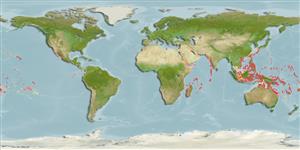>
Perciformes/Scorpaenoidei (Scorpionfishes) >
Scorpaenidae (Scorpionfishes or rockfishes) > Scorpaeninae
Etymology: Scorpaenopsis: Latin, scorpaena = a kind of fish, 1706 + Greek, opsis = appearance (Ref. 45335); vittapinna: From the Latin vitta for band and pinna for fin, in reference to the dark transverse band on the anal and pelvic fins. Not in Ref. 40966.
More on authors: Randall & Eschmeyer.
Environment: milieu / climate zone / depth range / distribution range
Ökologie
seewasser riff-verbunden; tiefenbereich 0 - 40 m (Ref. 123970). Tropical
Indo-Pacific: Indo-Pacific: South Africa and the Red Sea to Fr. Polynesia; north to Japan; south to Australia
Size / Gewicht / Alter
Maturity: Lm ? range ? - ? cm
Max length : 8.5 cm TL Männchen/unbestimmt; (Ref. 90102)
Rückenflossenstacheln (insgesamt) : 12; Rückenflossenweichstrahlen (insgesamt) : 9; Afterflossenstacheln: 3; Afterflossenweichstrahlen: 5; Wirbelzahl: 24. A broad dark band across soft portion of anal and pelvic fins. Maxilla extending posterior to a vertical at rear edge of orbit. Interorbital ridges low, flaring laterally to base of tympanic spines; no median interorbital ridge. Occipital pit shallow, its anterior edge inwardly curved. A small but deep suborbital pit. Suborbital ridge with 4 retrorse spines, the first on lacrimal; posterior points divided into 2 points (except in young). Supraocular tentacle varying from smaller than spine to as long as orbit diameter. Upper opercular spine usually double (may be divided into 3 or 4 points); lower opercular spine usually single (rarely double) (Ref. 42181).
Inhabits coral reefs and areas with rubble bottom (Ref. 42181).
Life cycle and mating behavior
Geschlechtsreife | Fortpflanzung | Ablaichen | Eier | Fecundity | Larven
Randall, J.E and W.N. Eschmeyer, 2001. Revision of the Indo-Pacific scorpionfish genus Scopaenopsis, with descriptions of eight new species. Indo-Pac. Fish. (34):79 p. (Ref. 42181)
IUCN Rote Liste Status (Ref. 130435: Version 2024-2)
Bedrohung für Menschen
Harmless
Nutzung durch Menschen
Tools
Zusatzinformationen
Download XML
Internet Quellen
Estimates based on models
Preferred temperature (Ref.
123201): 24.7 - 29.2, mean 28.3 °C (based on 2760 cells).
Phylogenetic diversity index (Ref.
82804): PD
50 = 0.5000 [Uniqueness, from 0.5 = low to 2.0 = high].
Bayesian length-weight: a=0.01288 (0.00620 - 0.02676), b=3.03 (2.86 - 3.20), in cm total length, based on LWR estimates for this (Sub)family-body shape (Ref.
93245).
Trophic level (Ref.
69278): 3.7 ±0.7 se; based on size and trophs of closest relatives
Widerstandsfähigkeit (Ref.
120179): hoch, Verdopplung der Population dauert weniger als 15 Monate. (Preliminary K or Fecundity.).
Fishing Vulnerability (Ref.
59153): Low vulnerability (10 of 100).
Nutrients (Ref.
124155): Calcium = 130 [66, 282] mg/100g; Iron = 0.933 [0.468, 2.114] mg/100g; Protein = 17.9 [15.9, 20.0] %; Omega3 = 0.244 [0.100, 0.683] g/100g; Selenium = 20.2 [10.1, 51.4] μg/100g; VitaminA = 315 [102, 888] μg/100g; Zinc = 1.7 [1.1, 2.6] mg/100g (wet weight);
